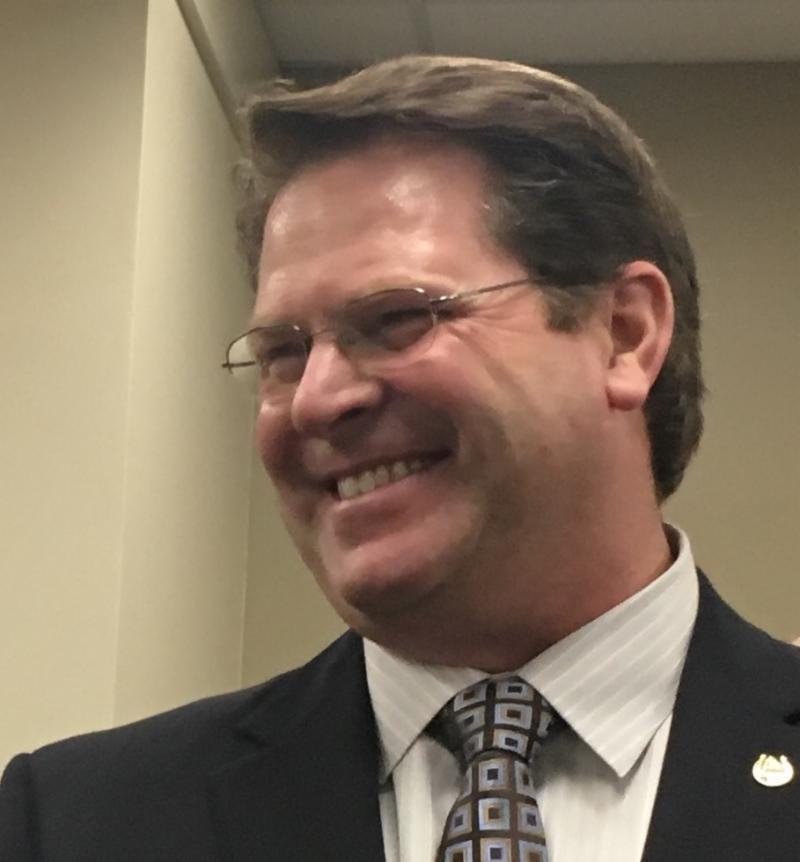
Photo of National HBPA CEO Eric Hamelback by Gwen Davis/Davis Innovation
You cannot do away with due process when you’re dealing with law. And that’s essentially what (HISA has) been given the keys to do.”
National HBPA Press Release
For the past several years, National HBPA CEO Eric Hamelback, on behalf of his board, has spoken out about the fundamental problems with what then was the looming Horseracing Integrity & Safety Act, including warning of its assault on due process. With HISA now law, resulting in screw up after screw up — changing the rules in reaction to gross injustices instead of starting out with rules and policies that were thoroughly vetted and based on science and lawfulness — horse owners, trainers and attorneys are starting to see Hamelback’s perspective played out in real time.
Hamelback discussed the egregiousness of HISA and its Horseracing Integrity & Welfare Unit with satellite radio host Steve Byk on Wednesday. Particularly important: While HISA’s default defense to eviscerating due process is to say that’s how other sports do it, Hamelback has repeatedly pointed out that major-league sports are following rules (including those established as part of collective bargaining with players’ associations) while horse-racing participants must follow laws. As Hamelback had preached for years: under HISA, allegations of violations literally now are federal cases.
Read below for highlights from the interview. If Eric’s comments strike a chord and you have concerns or personal experiences with how our industry is headed under HISA, please reach out to Eric at ehamelback@hbpa.org. The future of your industry is at stake, and the stake-holders need to speak up.
Hamelback: “For many of us, there’s only so many ways we can say ‘I told you so.’ We felt we did a good job to try to warn everyone that this bill had unconstitutionality aspects to it. I think without question we proved the bill was not constitutional when Senator McConnell forced in a ‘fix.’ But we also said that ‘fix’ did not fix what was completely unconstitutional in the bill…. When you look at due process, those are points we’ve been making for quite some time. You look at our General Counsel Peter Ecabert and then Pete Sacopulos, an equine attorney in Indiana, we’ve literally been making presentations on this very topic since April of 2021. We’ve tried to make everyone understand that when you do sign with HISA — you have to register or you can’t run, and they force you to do so — that gives them the right to essentially do what’s going on now.
“We’ve stayed quiet because our hope is that in October, when we are present once again in front of the Fifth Circuit Court of Appeals, that same panel of judges will uphold the unconstitutionality and we get some relief so we can correct what is going on and hopefully move forward as an industry without too much damage.
“When you look at Mac Robertson’s issue, he paid the money for the split (sample to be tested, which did not confirm the positive finding), (but) the quote unquote damage has been done. I’d like to point now to an elderly lady who had a Regu-Mate positive. Again, altrenogest is a medication typically used in the farm world but has merit, is a legal substance, yet when found in a male horse, they treat it as a banned substance, which makes no sense, no common sense whatsoever.”
“I want to address a few things that Ms. (HISA CEO Lisa) Lazarus has said recently… Ms. Lazarus talks about our ‘sport’ — again, a problem I have; we are an industry — but she says that we are the only sport that hadn’t been adjudicating things the way they are now under HISA. Our industry is governed by law. I always laugh when I say it, but I throw flags (as an official) on Friday, and those kids (playing high school football) don’t break a law. So stop comparing us to the NFL, MLB and the NBA. They do not have laws as rules. When you have a law as rules, and that rule is allegedly broken, you’ve broken a law and you need to be provided due process…. Stop comparing us to other sports. It is not another sport.”
“I’m going to continue to preach that the National HBPA vigorously promotes the highest standard of care and horsemanship. It’s our tagline. We want that for our racehorses. We want the highest safety and protocols out there. But at the end of the day, we have to understand that we cannot fix problems by creating regulations. We are regulating the horsemanship out of this industry — and that’s a problem.”
Steve Byk: “This interjected amount of doubt in a horseman’s veracity and essentially their horsemanship, that is not going to be instantly offset by a clean test in this case (such as Robertson). This is the old ‘Page 1 is the news of the positive and page 12 is the follow-up.’”
Hamelback: “… Yes, there was an uncovering of an environmental transfer from, I believe, a feed additive. But the damage has already been done. As you said, from Page 1 to Page 12 ‘oh, well, we’ll fix that.’ But what damage has been done already? — whether it’s losing horses, certainly losing the possibility of income. But what I’d like to focus on with that in mind, a lot was said (by HISA) that we want to do what’s in the best interest of the horse. There is no way you can tell me these sanctions and some of these rules and the penalties applied are in the best interest of the horse.
“… Ms. Lazarus has said publicly that they had to start from a clean sheet, and that is the farthest thing from the truth. Many of us in this industry expected HISA to be applied using the (Association of Racing Commissioners International) model rules and start from there and develop best practices. Now, I have no problem with laboratory uniformity… and maybe that’s happening. But again, laboratory uniformity and (testing) thresholds are not the same thing. And we are seeing medications such as Isoxsuprine, Regu-Mate, it just doesn’t make any sense for those things to be on the banned-substance list.”
“During the world of the RMTC (Racetrack Medication & Testing Consortium), everybody including the AAEP (American Association of Equine Practitioners) said, ‘OK, we’ll go back (from 24 hours) to a 48-hour restriction on administration time (for most medications, including anti-inflammatories) because that will get us to the point where the pre-race exams are well in advance of post time. And now? What are we doing? We’re backing it up even more. No science behind why we’re doing 96 or 72 hours for certain medications…. And yet horses are still going down. We’re still having issues — and all of their regulations are in place.
“It’s extremely frustrating for me, who has said publicly on multiple occasions that I base the decision I make on what I think is best for the horse. And that is unequivocally not happening now under HISA.”
Byk: “You’re starting to hear from owners now, who are beginning to understand the ramifications of the operation of this system.”
Hamelback: “Exactly…. The more and more you look into the rules.… some of the things of how they were written, they didn’t ask people who understand what’s going on…. It’s not in the best interest of the horse. They continue to make these stumbles and yet keep pushing forward and saying, ‘we’ll fix them later.’”
Byk: “And then there’s the expense of defending yourself as well.”
Hamelback: “Which is astronomical if you’re realizing now, as we are, that this is a federal issue. I’m paraphrasing Bill Mott. I think he said you’re making a federal case out of me taking care of the horse. Like all of a sudden, it’s a federal crime. And that’s exactly what we’ve been trying to say, that this just does not equate to our world as an industry. You cannot do away with due process when you’re dealing with law. And that’s essentially what they’ve been given the keys to do.”



